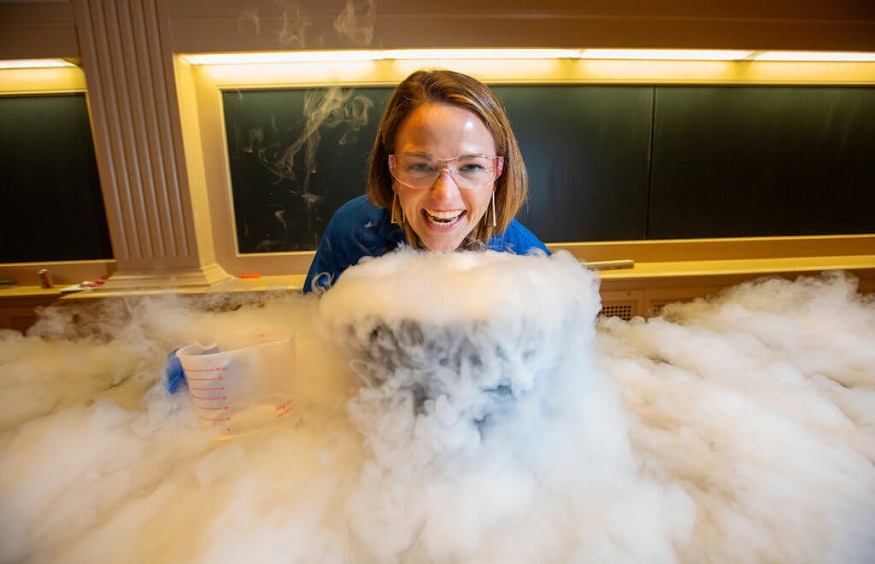
How to become a better chemist?
admin
- 0
If we think about it carefully, Physics – Chemistry is not that hard: as long as we really try to understand a principle, that we are a little interested in what we are doing, that we Don’t have that negative thought which is “I’ll never succeed, it’s too complicated” when you find yourself faced with a seemingly thorny exercise.
It’s true, how do you want to move forward if as soon as you encounter a difficulty you become discouraged? How ?
The notions of molar concentration, refraction and other gravitational interactions will perhaps become clearer if you practice a little, for example . Or that you ask someone reliable for explanations. To do all this is to seek to understand.
Saying to yourself “The teacher is rubbish and she doesn’t explain well. What good will that do us later anyway?”, then twiddling your thumbs while continuing to complain is not trying to understand.
What will this be used for later? It depends what you want to do! But the grade you get on the test may be reflected in your average if you do nothing.
Do you want to succeed? Give yourself the means, then.
Physics chemistry is not a complicated subject, it is a science that applies to the real world. Resume your lessons calmly and you will end up assimilating the concepts!
First, when does this formula apply? When we have an exercise talking about molar concentrations in an exercise involving the “preparation” of the mother solution to put it in a daughter solution.
And what does “C1”, “V1”, “C2”, and “V2” mean? (And yes, it is important to know the unit and the
Basically, know what the formula is for, and also what all the calculating stuff means, and you should be
If you know what to look for, even better! Start by doing simple exercises where you just have to apply the basic formulas, then when you feel like you have “the trick”, try the exercises requiring a little reasoning!
Acquire solid foundations
A few practice problems for each chapter and a good review of your summary sheets will be enough! In physics, each sheet must contain definitions (gravitational force, for example), laws ( Kepler’s laws, laws of attraction, etc.), theorems , units (very important!) and, finally, methods (approximation formulas…). In chemistry, use the practicals to make your cards and indicate the devices used. Indicate the objective of the experiment, the theoretical principle referred to, the equipment and products, the detailed description of the manipulation (clear diagram) and, finally, the exploitation of the results. Then, whether in physics or chemistry, you must study a certain number of “essentials”. Subjects for which you must have completed the exercises several times. If you master them perfectly, you will be able, by analogy, to solve all the possible subjects of the baccalaureate. Don’t memorize these problems! But remember the “approach”. It is she who is important to learn and, above all, to fully understand.
Are you looking for a physics chemistry teacher ?
Don’t let time trap you. Write your answers clearly (avoid, in literal development, abbreviations and symbols, etc.). To solve a problem, draw a diagram and define unambiguous notations when this is not done in the statement. Distinguish between the data and the requested result; the physical laws linking these data and this result will lead you to “the formula” which allows the resolution of the question. If your drawing is not similar, it does not matter, as long as you indicate the name of the device using a small arrow… The same goes for an electrical or electronic assembly. If, for example, you have several ohmic conductors in your assembly, number them precisely (R 1 , R 2 , R 3 ,…). And, in your text, specify the valu (in ohms) of each.
How to manage your time?
When testing, always take a watch or alarm clock. Indeed, time management is very important. You need to know how to optimize your working time according to the time/points ratio allocated to each question.
First of all, fatigue, which accumulates when a student goes to bed a little late several times in a row, to finish writing an assignment, preparing a lesson or a supervised assignment.
Another discouraging factor is of course less success than the previous year, a catastrophic DS grade, a completely failed lesson, a somewhat harsh remark from a teacher, the impression that the efforts made are not paying off. their fruits…. In short, the student thinks that he will fail his year, that he is incapable of keeping up and that he will never be taken into second year.


